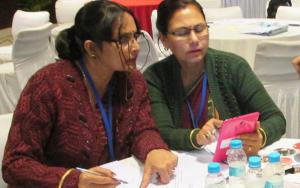You are here
- Home
- blog_categories
- Inclusive Innovation and Development
- TESS-India Boost Teacher Mentoring in Odisha
TESS-India Boost Teacher Mentoring in Odisha
26 January 2018

“What mentoring of teachers, ma’am? We are already monitoring them regularly – so what is the difference? Why do we need training to do this? We know what we have to do. We do not need any training at all.”
In 2015 this was vehemently stated to me by one of the Cluster Resource Centre Coordinators (CRCCs) during the first training session for teacher mentoring under the TESS-India programme in the Dhenkanal district of Odisha state. The words, which expressed the opinion of most of the participants, still come to my mind every so often. At the time I felt like tearing my hair out but, by the end of the session, their perception had changed a little – although only a little! I remember thinking to myself how much work we needed to do, and how tough changing this mind set would be.
Today, however, the scenario has changed entirely. Not only in Dhenkanal district but across the whole state which, believe me, is no mean achievement. Particularly considering the short period the TESS-India programme has been operational. As the saying goes: It is never too late! Indeed, at the start of this year, the TESS-India team received the good news that the Odisha government – through its “In-School Interventions for Elementary School” under the Sustainable Action for Transforming Human Capital (SATH) programme – will work in collaboration with TESS-India to support core pedagogy and equity in learning. In addition, under the Sarva Shiksha Abhiyan (SSA) programme, there will be interventions in digital initiatives and strengthening academic mentoring and monitoring through the training of CRCCs working in 4782 centres.
So how did such a gigantic leap forward happen? What was it that changed the situation so positively in such a short time? According to eminent educationists and experts – including the State Council of Educational Research and Training (SCERT), District Institute of Education and Training (DIET) staff, Block level functionaries, CRCCs and teachers – the change was due to the TESS-India programme. Launched in seven Indian states between 2012 and 2013, TESS-India is a collaborative academic venture to strengthen teacher education in India led by The Open University UK, working alongside the Indian government and funded by the UK aid from the UK Government.
The programme is an innovative academic venture aimed at providing support to the government of India in addressing the challenges faced in realising inclusive, participatory, child-centered, classroom teaching and learning. It offers a paradigm shift through its innovative approach of harnessing Open Educational Resources (OERs), online learning and social media tools for the Continuous Professional Development (CPD) of teachers. It is thus consistent with national policy directives and goals within India and sufficiently flexible to work at scale within multiple structures and levels in varying contexts across the system.
A senior DIET faculty member in Khurda district expressed the benefits of the programme beautifully as she excitedly shared that: “Of course we were doing many things even before TESS-India came on the scene to improve the quality of teaching-learning in our schools. But real change in classrooms was triggered by the thought-provoking materials. The programme was a godsend as it provided us with 125 free OERs, and 55 audio-videos. The OERs were short, simple, accessible and helped us realise the benefits of team work, reflection, discussion and sharing experiences on how to make classroom teaching-learning more student-centred, participatory and inclusive. These were just words till TESS-India came along.”
As another member explained, what really worked were the orientations and training – conducted by TESS-India – in which: “We realised that supervision and monitoring of teachers was not enough. What they needed was regular school-based support provided in a friendly, non-threatening and non- judgemental manner. What was called for was mentoring in its true spirit. This was a non-negotiable strategy if we wanted children to participate and learn. The next question was who will mentor teachers? The best person obviously is the one closest to teachers – the CRCC. And so the work began and changes slowly started to take place.”
In the evaluation undertaken in February 2017, data evidence indicated that it was the programme’s multi-pronged approach using different strategies that had led to its success. OERs (including video) accessed through SD-cards on mobile phones and tablets allowed easy consultation – and adoption – of ideas in the classroom. The launch of the TESS-India MOOC “Enhancing Teacher Education through OERs” reached out to huge numbers in the teaching community – 10,000 versions in English and 33,000 in Hindi were accessed – including those in remote rural and tribal areas. Participation in the MOOC led directly to the development of digital skills and confidence amongst teachers, for example the use of social media such as WhatsApp to share examples of practice and peer learning. All this was facilitated by a strong State Resource Group, while interactive hands-on training and follow-up resulted in teachers shifting towards a more participatory, student-centered teaching and learning approach.
Today teacher mentoring in Odisha has thrown up the exciting possibility of the movement spreading to other states and thereby advancing the Indian government’s agenda of CPD for teachers to enhance student learning.
Dr Sandhya Paranjpe is a retired Professor in Education (NCERT) New Delhi India, and current Head Academics TESS-India with SAVE the Children India (Bal Raksha Bharat), and Senior Education Consultant, UNICEF Maharashtra India
Share this page:
Contact us
To find out more about our work, or to discuss a potential project, please contact:
International Development Research Office
Faculty of Arts and Social Sciences
The Open University
Walton Hall
Milton Keynes
MK7 6AA
United Kingdom
T: +44 (0)1908 858502
E: international-development-research@open.ac.uk
.jpg)